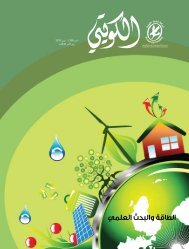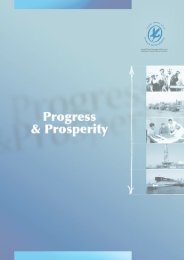4 - Kuwait Oil Company
4 - Kuwait Oil Company
4 - Kuwait Oil Company
Create successful ePaper yourself
Turn your PDF publications into a flip-book with our unique Google optimized e-Paper software.
wells pumped water with a salinitylevel higher than 7,500 ppm in1989, reaching 75 percent and85 percent in the years 1997 and2002 respectively. In Abdali, thesefigures were estimated at 55, 75and 90 percent respectively.During an interview at his officein Shuwaikh, Dr. Kotwickimaintained that “<strong>Kuwait</strong>’s naturalrecharge is only 160 million cubicmeters per year. However, weproduce 610 million cubic metersof freshwater per year, whichis almost four times more thanthe natural recharge.” This hugedisparity in the amount of water<strong>Kuwait</strong> consumes compared towhat is naturally available isreliant on <strong>Kuwait</strong>’s efforts at waterproduction, which relies heavilyon seawater desalination. Withoutseawater desalination, it would beimpossible for <strong>Kuwait</strong> to providethe amount of freshwater that isreadily available to its population.Desalination in <strong>Kuwait</strong><strong>Kuwait</strong>’s first desalination plant wasestablished at Ahmadi Port in 1951with a very modest productioncapacity. Over the years, <strong>Kuwait</strong>’sproduction capacity greatlyincreased as new technologiesdeveloped and new plants werebuilt. According to Dr. Kotwicki,the desalination of water in <strong>Kuwait</strong>will continue indefinitely because<strong>Kuwait</strong> simply has no other choicebut to desalinate water becauseof the country’s lack of freshwaterresources.While the Ministry of Electricityand Water does provide anexcellent service in its ability tocontinuously supply <strong>Kuwait</strong> withfreshwater, there are concernssurrounding the feasibility ofthe economic costs associatedwith providing an abundance ofdesalinated water to the generalpopulation. One of the majorconcerns, says Dr. Kotwicki, dealswith the cost of the governmentsubsidizing water in <strong>Kuwait</strong>, whichby comparison to the rest of theworld, is exceptionally discounted.“Water subsidies in <strong>Kuwait</strong>account for 2.5% of gross domesticproduct, or 6% of the nation’s oilrevenue,” said Dr. Kotwicki. “Thisis expected to increase in 2025 to25%, and in 2050, 100% of grossdomestic product will go towardthe production of water andelectricity.”To get an idea of just how much<strong>Kuwait</strong>’s water needs havegrown and are currently growing,consider the following: FreshwaterOctober - December 2012 35
















